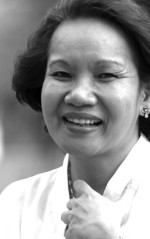
LOGARTA
At first it focused on current events. Yearly we had “The Most Well-Informed UP High Student Quiz Bowl”. Each section was represented by a contestant. Prof. Alfredo Montaño had always been the quiz master. His clever way of handling the activity gave the students so much fun and excitement, most really got a high. Perhaps it was the combination of intense loyalty to the section and the thrill of learning new things. When the batch of Fr. Rogel Abais, S.J. and Pablo John Garcia had, their batch reunion they asked to sponsor the quiz bowl and asked that Prof. Montaño be there as the quiz master.
Some winners of this annual tradition whom I recall were Allan Batuhan, Jovani Caminade, and Bruce Rivera. What thrilled the students more was that they won when they were not yet in senior year. Maybe Ashley Acedillo learned to be really involved with present realities in these quiz bowls. He actually traveled to Manila for this kind of competition.
This annual activity was later moved to be part of the many activities of UP Cebu to celebrate the Universal Declaration of the Human Rights. The latest development was the co-sponsorship of the Political Science Society and the social science educators of the pre-collegiate program.
We have always integrated the study of current events in the Social Studies (Araling Panlipunan) Curriculum reminding the students: “Ang alimango nga magduka-duka maanod sa baha!” The martial law experience followed by the EDSA People Power Revolution underlined the importance of human rights education.
The end of the dictatorship did not end violations of human rights. For many it pointed to the importance education and action on the rights listed in this historical document. Dr. Serena Diokno prepared a manual to guide teachers on human rights education. With Constitution of 1987 the Commission on Human Rights was established. It became a source of materials for lessons on the topic.
It is necessary for our students to actually read the actual list of rights. I ask them to prepare a table wherein they will indicate the number of the article and the subject of the article. Then we read articles and discuss whether these reflect recognition or violation of human rights. Films had also been viewed followed by reflection sessions on the impact of the violation of human rights different aspects of the person. And we ask: What should we do, having known our rights? What can we actually do with and for those whose rights have been violated?
In Our Lady of Joy Learning Center, every year, the Grade 10 students prepare posters for the other grade levels on the rights of the child. They are encouraged to make these age-appropriate. For Prep and Kinder they are asked to post them at eye-level for the children.
It is actually easier to discuss human rights and human dignity in a Christ-centered learning institution. In Christian Living Education, the grace of being children of God can be a very good starting point. There is also God’s great love and the commandments of love.
In Values Education Class let us recall our Filipino values, especially respect. The original Filipino’s sense of respect is so great it is in the level of reverence. When we think of our treasures as a people this is a major gem.
Now more than ever we need human rights education. In our locality every day killings might deceive our young into thinking these is the “new normal.” Let us not let these short cuts be the most effective solution. Let us take responsibility for nurturing the sensitivity and caring of our young.
This year of the youth let us support them as they promote the sacredness of human life.